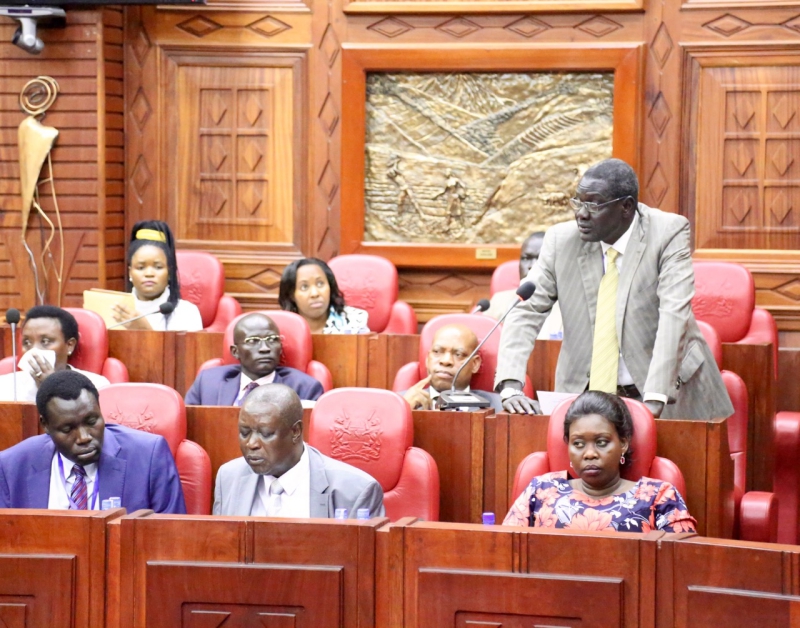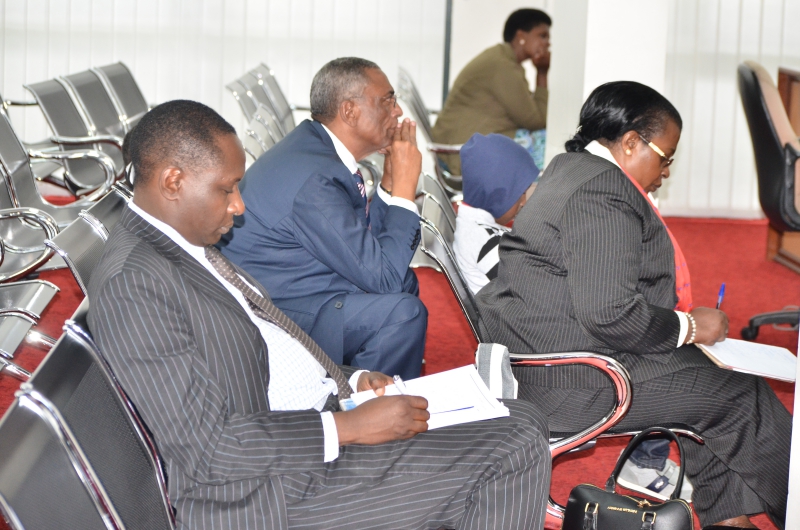
Audit Report presented to House and Adopted
East African Legislative Assembly, Arusha, June 1, 2018:
The House late Thursday (May 31st, 2018) afternoon debated and adopted the Report of the Committee on Accounts on the EAC Audited Financial Statements for the Year ended 30th June 2016. The report was presented by the Chair of the Committee on Accounts, Hon Dr Jumanne Ngwaru Maghembe to an attentive House.
The report attributes the overall financial position of the Community as reasonably healthy, with sufficient liquid assets to meet its maturing liabilities as and when due. The Community, the report states, had a budget of USD 112,233,039 in the Financial Year ending June 30th, 2016 and the actual expenditure totalled to USD 59,664,208 hence an overall budget performance of 65%.
The report covers the Audited Financial Statements of the EAC organs, projects and programmes for the year ended 30th June, 2016. It also covers the Lake Victoria Basin Commission (LVBC), Lake Victoria Environmental Management Project II (LVEMP II), Lake Victoria Basin-Partnership Fund, Inter University Council for East Africa (IUCEA), Lake Victoria Fisheries Organization (LVFO) and the Civil Aviation Safety and Security Oversight Agency (CASSOA).
The Report however states that EAC Institutions, projects and programmes across board have a challenge of budget absorption. It therefore calls for proper budgetary planning, coherency and consistency in the budgeting process.
In his presentation, Hon Dr Maghembe enumerated certain gross irregularities were noted in recruitment and award of short term contracts and cites it as contravening the Staff Rules and Regulations and the Treaty for the re-Establishment of the EAC. Similarly, many procurement processes in the EAC Organs and Institutions contravene procurement procedures.
The Audit Commission reported that the assessment of the status on the implementation of the previous audit recommendations of the previous two years (2013/2014 and 2014/2015), revealed that 41% of the audit recommendations made in the 2013/2014 audit were not implemented while 57% of the audit recommendations made in the 2014/2015 were not implemented.
The Report further calls for timely remittances of contributions by Partner States saying delays make implementation of EAC programs difficult.
“When funds are remitted towards the end of the financial year, they are not sent to the specific institution to which the money was budget for, but deposited to the reserve account”, a section of the report states.
On non-implementation of the previous audit recommendations, the Committee wants a proper mechanism to enable the Assembly to get periodical report(s) on the status on implementation of its recommendations from the Council of Ministers. It tasks the Council of Ministers to direct the Audit Commission to follow up and report on annual basis to the Assembly through EALA Committee on Accounts on the status of the Assembly’s recommendations’ implementation.
The Committee further observes a weak Audit function at the EAC and says inadequate staffing is affecting the audit function on all the Organs and Institutions of EAC. In the regard, an immediate upgrade of the Audit function in to a fully-fledged department to ensure effectiveness is therefore necessary, the report says.
In order to ensure proper management of EAC projects and programmes, the Assembly further calls for continuity and sustainability plans for all projects, that should be mainstreamed and aligned with EAC objectives and mission. It thus cites the branding of EAC Projects and Programmes as crucial to enhance the visibility of EAC activities.
The Committee further observes need for timely remittance of the VAT receivables across the Partner States by the revenue collection bodies saying such delay is uncalled for.
Staffing matters also take centre stage in the report with findings alluding to the fact that majority of the EAC institutions are grossly understaffed leading to non-segregation of duties and a corresponding violation of staff rules and regulations.
The Committee therefore recommends to the Assembly to urge the Council of Ministers to ensure that all the positions at EAC are properly filled as per the staffing structures. Other challenges include inadequate and weak regulatory framework governing the financial and procurement regimes at the EAC, weak compliance and verification systems of goods and services procured and weak disciplinary mechanisms to reprimand staff at the EAC among others.
The 149 page report received overwhelming support from Members at debate time. Rising in support of the report were Hon Dr Anne Itto, Hon Josephine Lemoyaan, Hon Fatuma Ndangiza, Hon Mohammed Mnyaa, Hon Dr Woda Jeremiah, Hon Kasamba Mathias and Hon Gideon Thoar Gatpan. Others were Hon Pamela Simon Maassay, Hon Florence Jematiah Sergon, Hon Fatuma Ibrahim, Hon Claude Barimuyabo, Hon Mukasa Mbidde, Hon Mary Mugyenyi, Hon Pierre Celestin Rwigema, Hon Gabriel Alaak, Hon Wanjiku Muhia, Hon Dr Oburu Oginga, Hon Susan Nakawuki and the Counsel to the Community, Hon Dr Anthony Kafumbe.
The Members raised various concerns and called for the need to address the various irregularities, strengthening of the weak systems, enhanced procurement and implementation of modalities leading to ISO certification.
- ENDS -
For more information, please contact:
Bobi Odiko
Senior Public Relations Officer
East African Legislative Assembly
Arusha, Tanzania
Tel: +255-27-2508240
Fax: +255-27-2503103
Cell: +255-787-870945, +254-733-718036
Email: BOdiko [at] eachq.org
Web: www.eala.org
About the East African Legislative Assembly:
The East African Legislative Assembly (EALA) is the Legislative Organ of the Community and has a cardinal function to further EAC objectives, through its Legislative, Representative and Oversight mandate. It was established under Article 9 of the Treaty for the Establishment of the East African Community.

